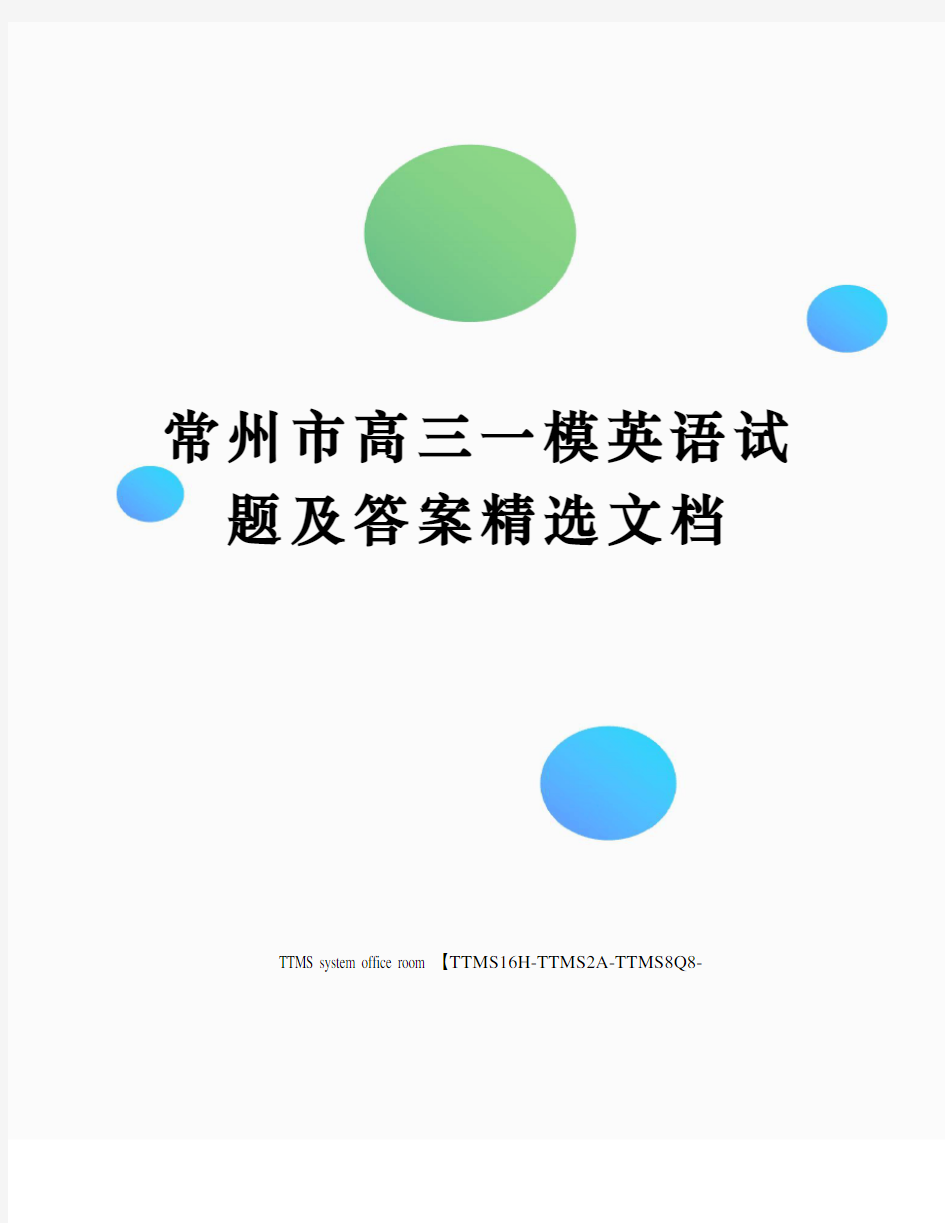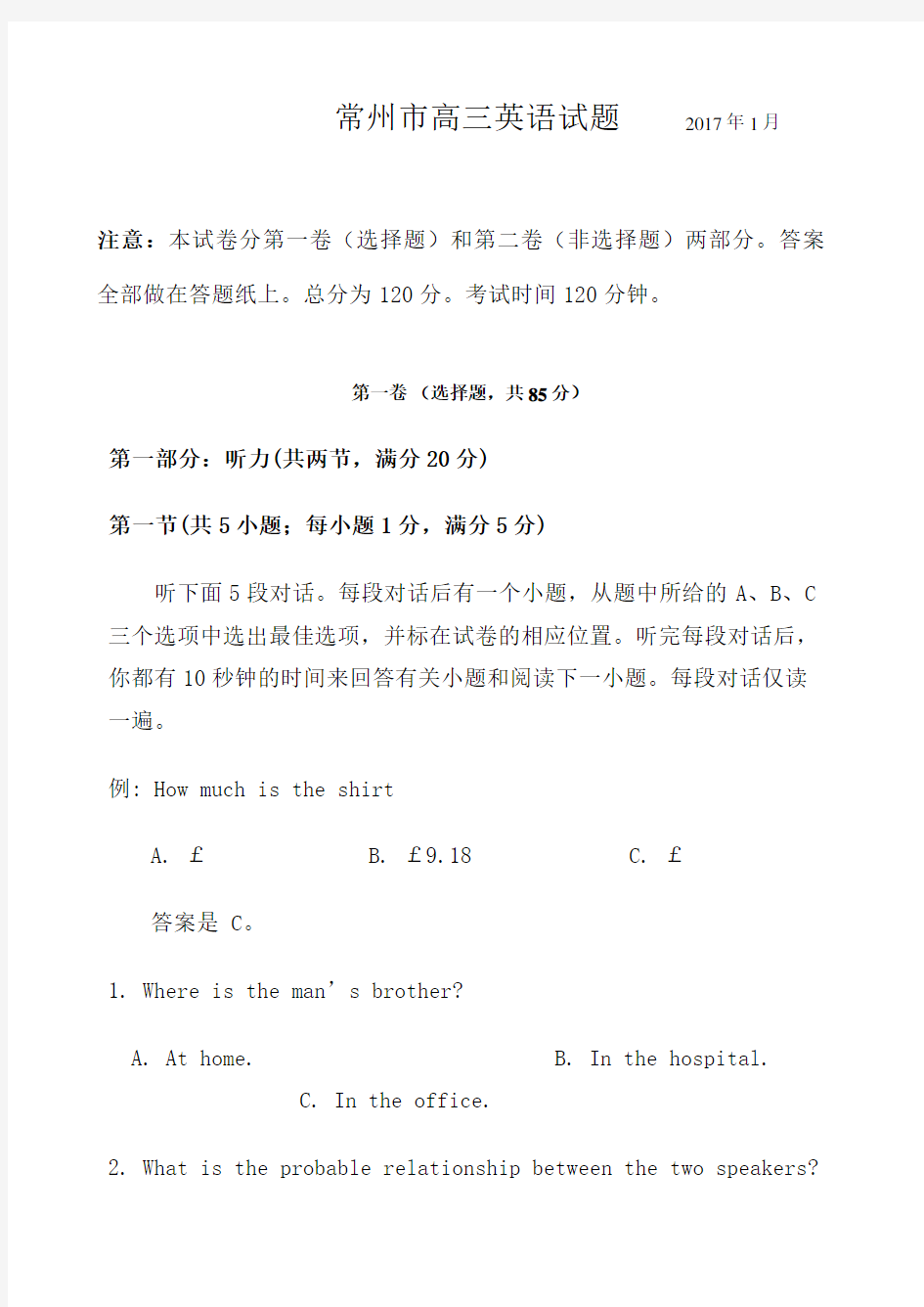

常州市高三一模英语试
题及答案精选文档 TTMS system office room 【TTMS16H-TTMS2A-TTMS8Q8-
常州市高三英语试题2017年1月
注意:本试卷分第一卷(选择题)和第二卷(非选择题)两部分。答案全部做在答题纸上。总分为120分。考试时间120分钟。
第一卷(选择题,共85分)
第一部分:听力(共两节,满分20分)
第一节(共5小题;每小题1分,满分5分)
听下面5段对话。每段对话后有一个小题,从题中所给的A、B、C 三个选项中选出最佳选项,并标在试卷的相应位置。听完每段对话后,你都有10秒钟的时间来回答有关小题和阅读下一小题。每段对话仅读一遍。
例: How much is the shirt
A. £
B. £9.18
C. £
答案是 C。
1. Where is the man’s brother?
A. At home.
B. In the hospital.
C. In the office.
2. What is the probable relationship between the two speakers?
A. Husband and wife.
B. Waiter and customer.
C. Teacher and student.
3. Who is the man?
A. The woman’s husband.
B. The woman’s boss.
C. The woman’s teacher.
4. What is the girl going to do next?
A. Go to school.
B. Have breakfast.
C. Pack her school bag.
5. What will the woman do at about ten o’clock?
A. Have a meeting.
B. Call Mr. Johnson again.
C. Go to Siemens.
第二节(共15小题;每小题1分,满分15分)
听下面5段对话或独白。每段对话或独白后有几个小题,从题中所给的A、B、C三个项中选出最佳选项,并标在试卷的相应位置。听每段对话或独白前,你将有时间阅读各个小题,每小题5秒钟;听完后,各小题给出5秒钟的作答时间。每段对话或独白读两遍。
听下面一段对话,回答第6和第7两个小题。
6. What does the woman want to find at first?
A. A fruit market.
B. A supermarket.
C. A parking area.
7. Where is the parking area?
A. Behind the fruit market.
B. In front of the supermarket.
C. Between the fruit market and the supermarket.
听下面一段对话,回答第8和第9两个小题。
8. What does the woman worry about her daughter?
A. She doesn’t get along well with her.
B. She failed the college entrance exam.
C. She doesn’t always have her own views.
9. What is the man’s opinion about teenagers’ problem?
A. They know nothing.
B. They don’t like their parents.
C. They want to be independent.
听下面一段对话,回答第10至第12三个小题。
10. What are the two speakers talking about?
A. A camp.
B. A photo.
C. An adventure.
11. In what aspect does the girl have in common with her
father
A. Figure.
B. Character.
C. Appearance.
12. How does the girl feel when talking about her father
A. Proud.
B. Angry.
C. Worried.
听下面一段对话,回答第13至第16四个小题。
13. Where does this conversation probably take place?
A. In a fast food restaurant.
B. In a supermarket.
C. In a store.
14. What is the woman’s favorite drink now?
A. Orange juice.
B. Coffee.
C. Pepsi-cola.
15. What is advertised by Beckham?
A. The woman’s glasses.
B. The woman’s shoes.
C. The man’s sports clothes.
16. What can we learn from the conversation?
A. The man is a big fan of Beckham.
B. The man has his own ideas about fashion.
C. The woman has been influenced by her fans.
听下面一段独白,回答第17至第20四个小题。
17. Who probably is the speaker
A. A teacher.
B. A writer.
C. A computer salesman.
18. What is Better Computer Skills about
A. How to use software.
B. How to use the Internet.
C. How to use a keyboard.
19. When will the course be had on how to use the Internet
A. On .
B. On .
C. On .
20. How many courses are there in all?
A. Three.
B. Four.
C. Five.
第二部分:英语知识运用(共两节,满分 35 分)
第一节:单项填空(共 15 小题;每小题 1 分,满分 15 分)
请阅读下面各题, 从题中所给的 A、B、C、D 四个选项中, 选出最佳选项, 并在答题卡上将该项涂黑。
21. _____ what many people think, HIV cannot be spread through
mosquitoes, a cough or sneeze, or by merely touching
someone with Aids.
A. Based on
B. Contrary to
C. Apart
from D. Regardless of
22. “Prehistorical powers” is one of the 10 most popular
phrases used by Chinese people, _______ many are frequently employed in online chats.
A. of whom
B. to whom
C. through which
D. among which
23. —Taylor Swift _____ the World's Highest-Paid Musicians of
2016 list.
— Really
Unbelievable!
A. took
B. made
C.
topped D. won
24. When you feel alone, just look at the spaces between your
fingers, and remember that's ______ my fingers fit
perfectly.
A. what
B. where
C. why
D. how
25. In order to attract American students to the _______
Chinese arts, Zhao and her team have turned to master
musicians, magicians and martial artists.
A. authentic
B. confidential
C.
tentative D. artificial
26. Next year's key challenges include risks in the financial
area and old issues that have yet ________.
A. solved
B. been solved
C. to solve
D. to be solved
27. — Do you know anything about the intellectual property
law
— Well, _____ you produce pirated goods, ____ you are against it.
A. when … so
B. unless…otherwise
C. if…then
D. although…yet
28. It is on Spring Festival Eve, ______ every one is
celebrating the Chinese new year, ______ Senior 3 students in China can take a rest from their study.
A. when; that
B. that; when
C. when; when
D. that; that
29. We’d visited the village without warning and selected our
interview subjects _______, so that we would get the real data.
A. beyond description
B. in particular
C. by
accident D. at random
30. Senior political figures worldwide have _____ one-China
policy and have _____ support for the widely accepted
principle after it was challenged by US president-elect
Donald Trump.
A. backed; voiced
B.
sustained; spoken
C. approved; declined
D. supported;
rejected
31. The type and quantity of illegal drugs a person is
carrying when ____ by the police determine the punishment, _____ from a small fine to life imprisonment.
A. caught; ranging
B.
caught; ranged
C. catching; ranging
D. catching;
ranged
32. — Did they all pass the driving test
— Yes, ___________________, they all succeeded.
A. as tough as they were
B. tough as was it
C. tough as it was
D. as tough as were they
33. “But for the fact that you _______ here for 3 years, I
_______ in this key high school now, facing its endless
homework and exams!” the poor girl cried to her helpless father.
A. studied; wouldn’t have studied
B.
studied; wouldn’t be studying
C. had studied; wouldn’t have studied
D. had
studied; wouldn’t be studying
34. — What makes you so nervous
— The China vs Iran World Cup qualifier will ________
tonight.
A. set off
B. show off
C. take off
D. kick off
35. — It annoys me when a person's cell phone goes off during
a movie!
— Yeah, me too. It ___________.
A. really bites my tongue
B. really gets on my nerves
C. makes me see the handwriting on the wall
D. gets me to kill the fatted calf
第二节:完形填空 (共 20 小题;每小题 1 分,满分 20 分)
请阅读下面短文,从短文后各题所给的 A、B、C、D 四个选项中,选出最佳选项, 并在答题卡上将该项涂黑。
Until a few years ago, I was a calm person. If you were going to __36__ me I almost never lost it __37__; of course I felt hurt, but I didn’t show it.
Then, one day, I met my husband and I fell __38__ in love with him, a proud Italian who loudly discusses things __39__ with himself when he’s not happy. Things got worse for me when we started __40__ on things. He seemed really angry and loud, while I seemed detached and polite. Truth is that I was __41__ too. Fight after fight, he always acted as if nothing had happened a few minutes after each quarrel, while my moments of __42__ discontent started to __43__ more and more
in time until they became hours, sometimes even days.
I felt this had to change and the conversation went
__44__ like this:
Me: “Either you change your __45__ when we fight or I will start avoiding any discussion, and this will __46__ our relationship.”
Him: “Did you __47__the Mpemba Effect If you put two
__48__ containers filled with the same amount of water into the fridge except that one has boiling water in it while the other one has water at ambient(周围的) __49__, the boiling water will __50__ faster than the ambient water. Baby, you got to boil first, to cool down faster. That’s why the Italians live __51__ than Canadians.”
The connection he suggested is to be __52__, but I have learned a fact I didn’t know, one that has __53__ me to understand that if I’m angry about something or someone, for that anger to disappear, it has to be towards the __54__ or otherwise it is like hiding the dust under the __55__: your house might look clean, but it is not.
36. A. cheat B. offend C. impress D. defend
37. A. in return B. in place C. in public D. in time
38. A. hopelessly B. steadily C. hurriedly D. blindly
39. A. always B. ever C. even D. seldom
40. A. working B. disagreeing C. operating D. trying
41. A. boiling B. struggling C. controlling D. preparing
42. A. possible B. abrupt C. extra D. inner
43. A. spread B. withdraw C. recover D. expand
44. A. more or less B. sooner or later C. by and by D. up and down
45. A. vision B. viewpoint C. attitude D. attention
46. A. compensate B. sacrifice C. mend D. clarify
47. A. hear about B. worry about C. learn from D. hear from
48. A. mobile B. relevant C. solid D. similar
49. A. level B. temperature C. heat D. environment
50. A. burst B. deposit C. explode D. freeze
51. A. longer B. shorter C. wealthier D. simpler
52. A. practiced B. proven C. inspected D. created
53. A. informed B. reminded C. inspired D. required
54. A. outside B. inside C. public D. personal
55. A. dustpan B. broom C. roof D. carpet
第三部分:阅读理解 (共 15 小题;每小题 2 分,满分 30 分)
请阅读下列短文,从短文后各题所给的 A、B、C、D 四个选项中,选出最佳选项, 并在答题卡上将该项涂黑。
A
56. According to the passage, when in recovery position, the casualty is _________________.
A. lying on his/her back
B. lying on one side of his/her body
C. in a relatively severe situation
D. being given initial breaths or CPR
57. Which of the following is NOT correct when giving first aid?
A. Make sure of your own safety before helping the casualty.
B. Call for an ambulance immediately if the casualty has no breathing.
C. Make sure casualty’s chest rises when giving initial breaths.
D. After every15 compressions, there should be one initial
breath.
B
Decades ago, scientists had a much more fixed conception of the brain. They believed that how it develops when you’re a
kid more or less determines your brain structure for the rest
of your life.
But now we know that’s not true. A landmark study in 2000 looked at grey matter in London taxi drivers. The drivers had more grey matter volume in the hippocampus, a little seahorse-shaped part of the brain that deals with memory. Here was real evidence of neuroplasticity, the ability of the brain to
change and form new neural(神经的) connections.
In 2010, Swedish scientiststested a group of younger (21-30) and older (65-80) adults for six months, and ‘did not detect any significant age-related differences in neuroplasticity of white-matter microstructure’. Translation: older brains can change too.
So what happens to the brain of an adult who learns languages A group of adult studentslearning Chinese were
tested over a nine-month period in 2012, during which they showed ‘improved white-matter quality’. White matter is what connects neural cells, so the better connected, the better you can accomplish a cognitive(认知的) task.
Still want more Oh, alright then. Language learning builds up your"cognitive reserve", which makes you more resistant to brain damage. If you’re bilingual(双语的), congratulations!